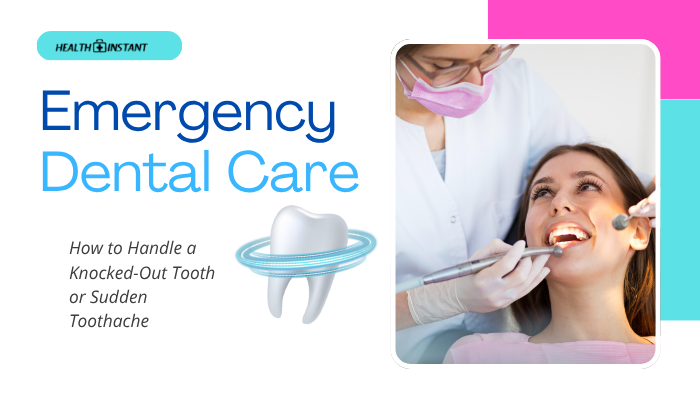Introduction
Dental accidents can be unexpected—a slip on ice knocks out a front tooth, or a fierce toothache starts right before bedtime. Knowing how to handle such scenarios promptly can save your tooth or at least minimize pain until you reach professional care.
This guide covers immediate first aid for avulsed (knocked-out) teeth, solutions for sudden toothaches, and practical tips to keep you comfortable while waiting for a dentist appointment.
Knocked-Out Tooth (Avulsed Tooth)
Immediate Steps
- Stay Calm
- Panic can delay critical minutes that make a difference in tooth survival.
- Panic can delay critical minutes that make a difference in tooth survival.
- Find the Tooth
- If it’s a permanent tooth, there’s a chance to replant it if you act quickly (within 30 minutes is ideal).
Handling the Tooth
- Pick It Up by the Crown
- Avoid touching the root to prevent further damage.
- Avoid touching the root to prevent further damage.
- Do Not Scrub or Use Soap
- If dirty, gently rinse the tooth with milk or saline. Avoid scrubbing or scraping tissue fragments.
Transporting the Tooth
- Place It Back in the Socket (If Possible)
- Carefully position tooth in the gum if you can, then bite gently on gauze to hold it in place.
- Carefully position tooth in the gum if you can, then bite gently on gauze to hold it in place.
- In Milk or Saline
- If reimplanting isn’t feasible, submerge the tooth in milk, saline, or a specialized tooth preservation kit (like Save-a-Tooth).
- If reimplanting isn’t feasible, submerge the tooth in milk, saline, or a specialized tooth preservation kit (like Save-a-Tooth).
- Moisture Is Key
- The tooth root cells must stay hydrated. Don’t wrap in a dry tissue.
Seeing a Dentist ASAP
- Contact Your Dentist Immediately
- If none available, go to an emergency room or urgent dental clinic.
- If none available, go to an emergency room or urgent dental clinic.
- Time Sensitive
- The sooner a dentist reimplants the tooth, the greater the success rate for reattachment.
Managing a Sudden Toothache
Rinse and Inspect
- Warm Saltwater Rinse
- Helps dislodge trapped food or reduce mild inflammation.
- Helps dislodge trapped food or reduce mild inflammation.
- Check for Stuck Particles
- Use dental floss gently around the painful area to remove possible debris.
Pain Relief Measures
- Cold Compress
- Place a cloth-wrapped ice pack on the cheek if swelling is present.
- Place a cloth-wrapped ice pack on the cheek if swelling is present.
- Over-the-Counter Medications
- Ibuprofen or acetaminophen can alleviate pain short-term.
- Ibuprofen or acetaminophen can alleviate pain short-term.
- Dental Anesthetic Gels
- Temporarily numb the gum area (follow instructions carefully).
- Temporarily numb the gum area (follow instructions carefully).
When to Seek Dental Care
- Persistent or Worsening Pain
- If pain remains or intensifies overnight, schedule a dentist visit.
- If pain remains or intensifies overnight, schedule a dentist visit.
- Signs of Infection
- Fever, swelling, or foul odor from the area could indicate an abscess.
- Fever, swelling, or foul odor from the area could indicate an abscess.
- Cracked Tooth
- If you suspect a fracture, an X-ray evaluation is necessary to prevent complications.
Additional Tips for Oral Emergencies
- Keep a Dental Kit
- Stock gauze, OTC pain meds, small container for a knocked-out tooth, and your dentist’s contact details.
- Stock gauze, OTC pain meds, small container for a knocked-out tooth, and your dentist’s contact details.
- Avoid Aspirin (for direct gum application)
- Aspirin’s acidity can burn gum tissues.
- Aspirin’s acidity can burn gum tissues.
- Know Local Emergency Rooms
- Some hospitals may have emergency dental services or can handle severe bleeding or infection.
Conclusion
Immediate and proper action is vital when faced with a sudden dental emergency like a knocked-out tooth or intense toothache. In the event of avulsion, handle the tooth carefully by the crown, reinsert if possible, or store it in milk, and see a dentist quickly.
For painful toothaches, simple measures like warm saltwater rinses, flossing, and cold compresses can alleviate discomfort until a professional evaluates the issue. Having a basic knowledge of these steps—plus a prepared kit—enables a calm, effective response to dental crises, preserving oral health and minimizing complications.
References
- American Dental Association (ADA). (2020). Guidelines for Dental Emergencies.
- Academy of General Dentistry (AGD). (2019). Knocked-Out Tooth: What to do Immediately.
- American Association of Endodontists (AAE). (2021). Managing Dental Trauma.
- Mayo Clinic. (2022). Toothache: Self-care and first aid tips.
Disclaimer: This content is informational only and not a substitute for professional dental or medical advice. Always consult a qualified dentist or healthcare provider for personalized guidance.

